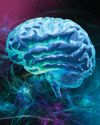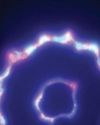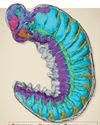
Traditional graphics cards and processors needed to handle the workload are expensive and large and run hot-relying on the space and power supply of a desktop tower. And if you want comparable strength on the go, you're looking at bulky gaming laptops with poor heat dissipation and battery life.
But the arrival of Valve Corporation's Steam Deck redefines what a gaming computer can be by creating a whole new category: affordable handheld gaming PCs. The Steam Deck condenses a powerful rig into an 11-inch portable system that weighs just 1.5 pounds.
How Valve Keeps It Cool
Computers require proper thermal management to remove excess warmth, Overheated components throttle gaming performance with lag and lost frames. The cramped guts of mobile devices can't withstand high temperatures nearly as well as the larger confines of desktop.
To address this, Valve built a thermal management system into the Steam Deck that uses a mix of software and just a single fan to cool multiple parts by specific amounts. "We can essentially allocate our cooling budget to each component by controlling the airflow path over the motherboard and the thermal coupling from that component," says programmer Pierre-Loup Griffais.
This draws less power and makes for a lighter console without creating a distracting amount of noise.
Thermal control is left in your hands so you can toggle the energy usage limit directly from the Steam Deck's quick settings. This restricts how much wattage the processor uses.
Lowering its levels keeps the heat down and extends battery life at the cost of performance. But for even deeper control, you can individually cap frame rates and refresh rates directly from the Deck's software.
Denne historien er fra January - February 2023-utgaven av Popular Mechanics US.
Start din 7-dagers gratis prøveperiode på Magzter GOLD for å få tilgang til tusenvis av utvalgte premiumhistorier og 9000+ magasiner og aviser.
Allerede abonnent ? Logg på
Denne historien er fra January - February 2023-utgaven av Popular Mechanics US.
Start din 7-dagers gratis prøveperiode på Magzter GOLD for å få tilgang til tusenvis av utvalgte premiumhistorier og 9000+ magasiner og aviser.
Allerede abonnent? Logg på

ONE OF THE 'GREATEST THREATS' TO THE PACIFIC NORTHWEST ISN'T WHAT YOU THINK.
EXPERTS ARE PREPARING THE REGION AGAINST THE THREAT OF DANGEROUS VOLCANIC MUDFLOWS, KNOWN AS LAHARS, WHICH COULD INUNDATE THE COMMUNITIES SURROUNDING MT. RAINIER IN AS LITTLE AS 30 MINUTES.

THE WORLD'S TOUGHEST ROW
They rowed 3,000 miles across the Atlantic, battling unpredictable weather, chaotic seas, and finicky equipment. But what they discovered gave them profound new insights into the power of the ocean.

HOW TO DIY OFF-GRID SOLAR
SPEND THE TIME UP FRONT AND PLAN IT CAREFULLY TO AVOID DISAPPOINTMENT

Are We on the Verge of an ARMS RACE in SPACE?
RUMORS OF A RUSSIAN SPACE NUKE, ALONG WITH OTHER SATELLITE-TARGETING WEAPONS, HAVE MADE GEOPOLITICAL TENSIONS EXTEND INTO ORBIT.

Fresh Fingerprints on an Ancient Statue
A CLAY FIGURINE HAS SPENT MILLENNIA incomplete, waiting at the bottom of a lake for its long-dead craftsman to finish the Iron Age-era statuette.

Quantum Entanglement in Our Brains
IT HAS LONG BEEN ARGUED THAT THE human brain is similar to a computer. But in reality, that's selling the brain pretty short.

The Tools of Copernicus
WAY BACK IN 1508, WITH ONLY LIMited tools at his disposal, Nicolaus Copernicus developed a celestial model of a heliocentric planetary system, which he described in hist landmark work De revolutionibus orbium coelestium. It was a complete overhaul of our conception of the universe-one that, unfortunately, earned him the ire of the Catholic church for decades after his death-and forever changed the way we look at the stars.

Building a Sixth-Generation Bomber Raptor
THE GLOBAL COMBAT AIR Programme (GCAP)-a project by the U.K., Italy, and Japan to develop a sixth-generation stealth fighter-has been busy at the drawing board reshaping its vision of the future of air warfare. And judging by the new concept model unveiled at this year's Farnborough air show, that future has big triangular wings.

The Electroweak Force of the Early Universe
TODAY, THE UNIVERSE AS WE KNOW IT IS governed by four fundamental forces: the strong nuclear force, the weak nuclear force, electromagnetism, and gravity.

This Ancient Fossil With a Brain and Guts
WE KNOW WHAT FOSSILS LOOK like. For example, typical dinosaur fossils are bones turned to stone and preserved from the passage of time, located, if we're particularly lucky, in large collections that can be reassembled to represent the beast they used to prop up in their entirety.